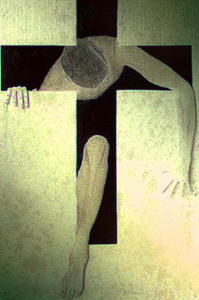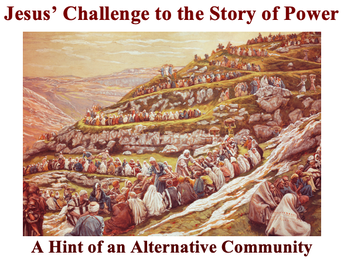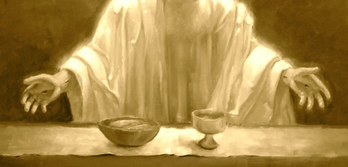 Many Christian advocates for social justice cry out for deconstructing privilege and the privileged from a platform of privilege themselves, a place of power, celebrity, notoriety, and/or money (not to exclude address, i.e., where they live and the resources at their disposal). Over and over, their advocacy seems to contradict their status and lifestyle. These same advocates for social justice use the Bible (and for the most part I align and, even, agree with much of their message; not so much their means, which are, for the most part, not biblical, but mostly cultural, political, and status resourced). Here’s what strikes me: The original advocacy (i.e., the gospel of Jesus, the Messiah) and how it changed things, how it deconstructed, and, then, reconstructed habits and lives and attitudes did not occur from the place of power, but from the place of powerlessness. We learn this, first, from the humanizing (i.e., incarnation) of the One who was in the form of God from all eternity taking on the form of a slave (Phil 2); and, second, from the small gatherings of believers in homes (living rooms), we now call churches, made up mostly of the poor and powerless in the early decades of the church. Of course, there were some wealthy among them and some who provided homes for churches to gather; yet, here, too, as Christians and people that used their homes for believers to gather would have lost their status and social standing (at least in part), leaving them to be classed among the powerless and the bottom-demographics of the Roman Empire and Greek world. It would be nearly three centuries before the wealthy, educated, and powerful had control over the affairs of the church. No longer in homes. State (i.e., Empire) sanctioned and often constructed buildings became the addressed-venues of churches. Highly trained and Empire sanctioned clergy had authority over the church. No longer food for a supper, but tokens of bread and wine were used and guarded and distributed by this now elite, often cosmopolitan, clergy. Now, the State (or Empire) controlled the advocacy, that is the results of the gospel. The poor and the powerless among the Christians were separated from their more wealthy, educated, and affluent Christian brothers and sisters, by design and by default. Yet, it was not so in the beginning and for about 300 years of church history. Obviously the shift crept in, but was not fully established until the Emperor “converted” (but was not baptized) and the Empire started creating a space of power for the leaders of the church. My concern here is not to dwell on how the church came to know power and has been able to produce power and the powerful, but to highlight that our present social justice advocates do so from a platform of power that the very gods of empire (call it as you will, colonialism, Christendom, American upward mobility—no matter, it is the powers that) has given (such power) to them. Few seem to divest themselves of power and privilege (as did Jesus, whom they say they follow) and take on the form of a slave and being obedient to the point of death, even death (i.e., dying to self) on a cross (again, cf. Phil 2) on which they are called to carry; but, yet, offer, still, their justice rhetoric and (really what is often simply) political vision from a place of culturally designed privilege and power. Until this is recognized (and deconstructed I might add), such advocacy will rely on the power of the State to enforce their vision (no matter how clothed in biblical language it might be). It is my humble opinion that we need to rethink church, especially as the place where systemic change happens, even though it is a place (and the space) of the poor and powerless. (Well, it should be.) Of course, plenty of “churches” need repentance, an attitude of lament, and a call back to the gospel (liberal, progressive, and conservative churches), but, nonetheless, it is, still, the church (local churches) where the alternative of God’s kingdom is to be lived (by believers) and observed (by outsiders). (Not “look how we vote” or “look how we protest”; but “look how we live and fellowship as strangers and unequals, as brothers and sisters in Christ, a wholly new family in Christ.”) The church, a church, local churches scatter from street to street, neighborhood to neighborhood, places where strangers and unequals meet over a meal (break bread) and celebrate (raise a cup) that they have no other Lord than the risen Messiah, who sits at the Father’s right hand (their only source of power, which is lived by denying themselves and taking up a cross). Such advocacy should not rest in individuals who have forms of cultural power at their disposal, but an advocacy that stems from a gathered-household of faith. Social justice advocacy should be a lived-church thing (and for that matter, the place of no power, no culturally derived and given power). Social justice is a lived-church advocacy. Our advocacy for social justice, like any of our boasting (our culturally, socially, and economically derived desires, vision, or means of power), needs solely to be first and foremost “in the Lord” and made from a willing place of foolishness. Our social justice advocacy platform, the place where we are “like the scum of the world, the refuse of all things,” this is the place, Jesus’ church, local churches, find themselves and where authentic social justice advocacy has its gospel platform.
0 Comments
 Matthew 14 (Sunday service, 5/12/19) Matthew 14 (Sunday service, 5/12/19) I’m doing some study on Matthew 14 this afternoon and ran across a rather powerful quote from Stanley Hauerwas’s commentary on Matthew. I have been thinking these thoughts for a while now (and I will be sharing some of them this coming (5/12/19) Sunday), namely, that those in power and the powerful must use power to stay in power; sadly, most use of power by the powers and the powerful is threat, violence, or the subtle making of promises to those without power (to grant or take away) something needed. It is this last use of power that is most deceptive and, well, rather powerful. You see, it matters not whether the powers or the powerful actually deliver on said promises, for it is the making of the promises that counts because those with no power have no choice but to acknowledge (bow before, vote for, smile in adoration, applaud or laud, promote, et al.) that it is only in the powers and powerful that they will ever see the good for themselves or their neighborhoods (even though they don’t ever see the promises delivered). In Matthew 14, Jesus (that is, Matthew in the narrative) is hinting at an alternative to power, first in Jesus as that alternative and then at the development (forthcoming, i.e., the forming of the) community that follows Jesus. We, the church (read a local church), are that alternative to the story of power. Here’s the quote:
The goal of redemptive history is the cosmic restoration of creation. This is the story of the Bible. This is the church’s story. This should be your church's story. God has determined to use a redeemed people to herald this message. The ekklesia of Jesus, the gathered-church, composed of redeemed and restored people, living out the gospel, illustrating this cosmic restoration through its treasonous worship of the risen Jesus, the Lord over all other claims to the throne, its missional behavior to its neighbors, and , particularly, through the fellowship of restored human relationships among strangers and unequals. The gathered-church of the Lamb of God is unlike any and all other rebellions and resistance movements: church is not (ever) aligned with a government or party or state or king in order to violently overthrow or by means of State-authority and any form of violence to maintain; church is never (ever) aligned with the spilling of blood through strength or cunning to change or maintain the status quo of an unredeemed social structure or cultural state of affairs; and, where privileged to participate, church does not count on the ballot-box to overthrow power or maintain a particular person or party in power. The church uses a table of fellowship over food, broken bread, and a raised cup of allegiance to the risen King of kings and Lord of lords, now seated at the right hand of God in the heavenly places. This has been and is God’s way of, not saving the State or some preferred demographic or cultural value, but demonstrating that all of history is moving toward His ultimate conclusion of a restored creation. How does God reveal and accomplish this purpose of history? Little and grand tables, scattered throughout time and place, some well noticed and many hidden in the back alleys and among the margins–this has been where God does his rewriting of corrupted history and the deconstructing of the powers of humankind. This is church-story. Not just the best story. But the true story of history. This is the story you and I are invited into; and, the gathered-church is the place God restores all things. Not the battlefield. Not the ballot box. But at tables of strangers and unequals.
In this, they mistakenly imagine that to pass a referendum, elect a candidate, pass a law, or change a policy is to change culture. In truth, they probably know better, but in terms of the amount of energy expended and money spent, the net effect is a view much like this. While Christian activists (conservative and progressive) have been fairly influential in the political sphere at different times in recent decades, they have embraced a means to power that seethes with resentment, anger, and bitterness for the injury they believe they have suffered. The public and political culture of contemporary Christianity have become defined by such negations. Christians believe that they have a legitimate right to participate in the democratic process and they are, of course, right. The problem resides with the political culture they not only embrace but have helped to create. The tragic irony is that in the name of resisting the dark nihilisms of the modern age, Christians—in their will to power and the ressentiment that fuels it—perpetuate that nihilism. In so doing, Christians undermine the message of the very gospel they cherish and desire to advance" (James Davison Hunter from To Change the World). *My previous post on Voting and the Table
|
AuthorChip M. Anderson, advocate for biblical social action; pastor of an urban church plant in the Hill neighborhood of New Haven, CT; husband, father, author, former Greek & NT professor; and, 19 years involved with social action. Archives
February 2024
Categories
All
|
Pages |
More Pages |
|


 RSS Feed
RSS Feed